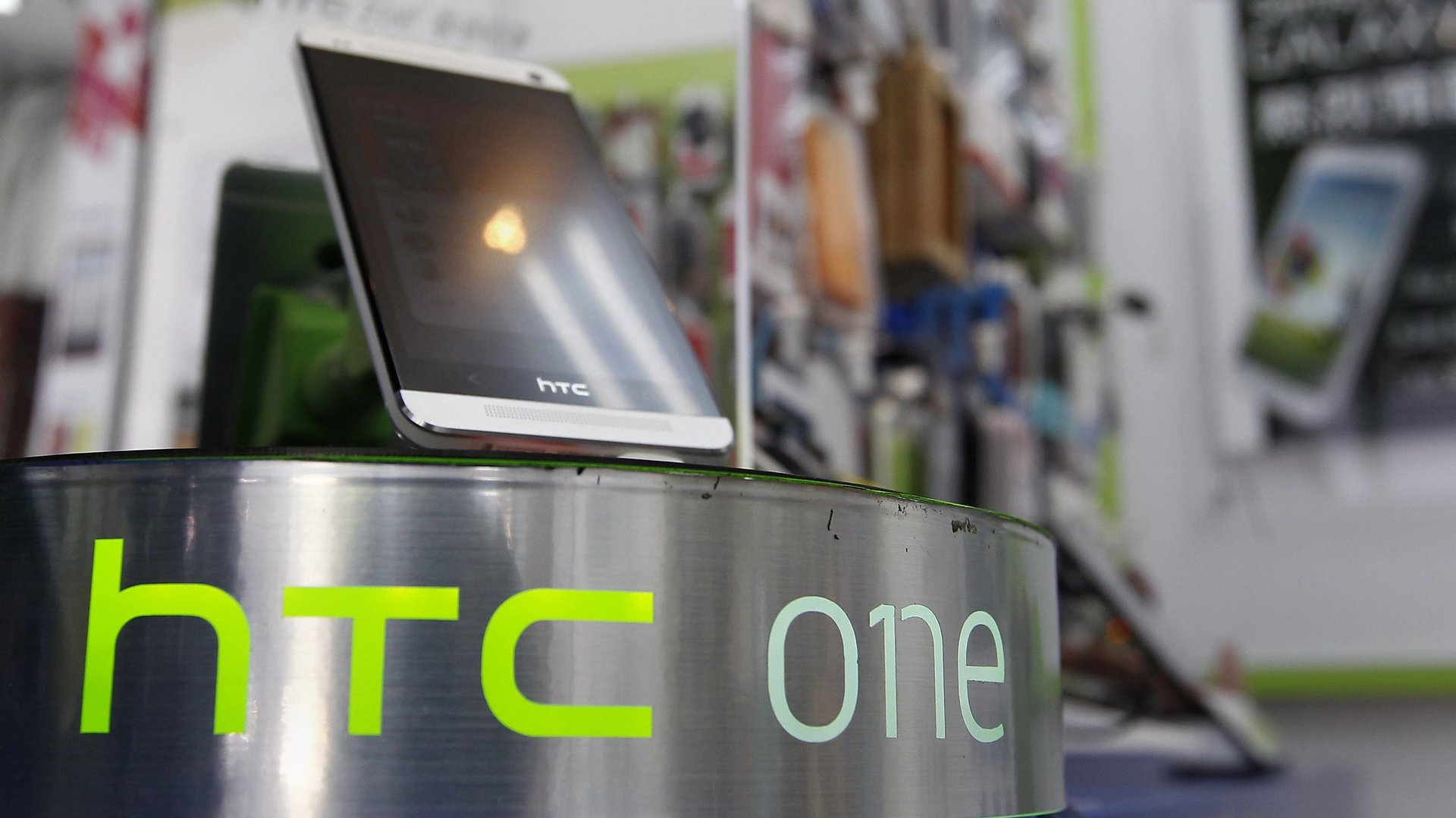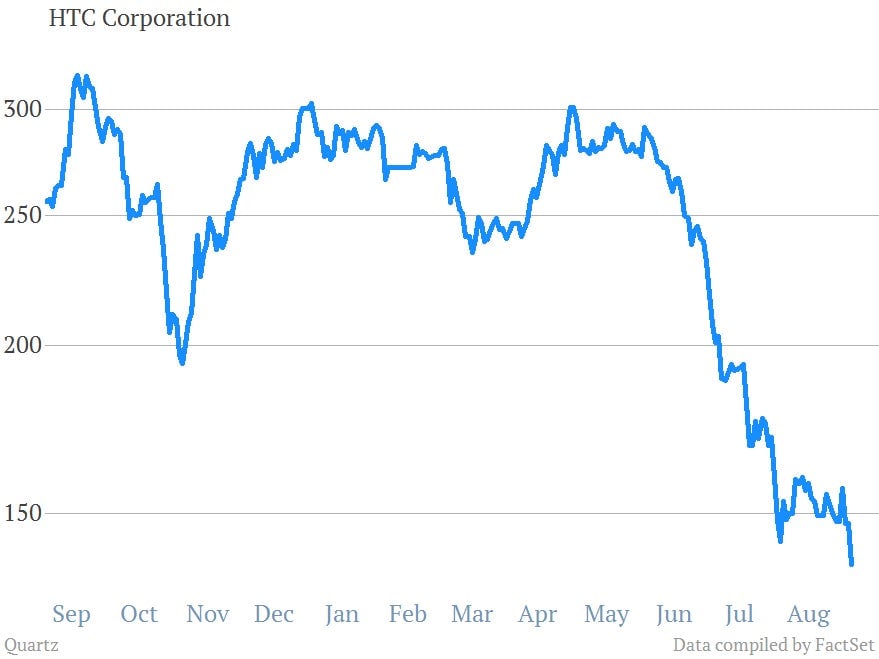HTC’s star smartphone designer allegedly stole secrets for a Chinese city government
Taiwanese authorities have arrested three former heads of HTC, a leading Taiwanese smartphone maker, on suspicion of handing trade secrets over to the city government of Chengdu, in Sichuan province, as Reuters reports, citing Next Magazine.


Taiwanese authorities have arrested three former heads of HTC, a leading Taiwanese smartphone maker, on suspicion of handing trade secrets over to the city government of Chengdu, in Sichuan province, as Reuters reports, citing Next Magazine.
According to the latest reports, the trade secret theft charges are only against Thomas Chien, the product management guru behind the much-lauded HTC One phone, while Chien and the other two executives—R&D director Wu Chien-Hung and design manager Justin Huang—are also charged with embezzlement of around $668,000 in fraudulent invoicing. The court case began today.

What was Chien doing in Chengdu?
Chien had established a company in the mainland called “Jade,” which was allegedly a partnership of some sort with the Chengdu government, as well as a corresponding Xiaoyu (“Little Jade”) company in Taiwan. In exchange for the information, the Chengdu municipal government was allegedly to pony up a big chunk of funding, including the setup, operation and marketing costs, according to prosecutors cited by Next Magazine’s report.
What did he share?
Not only did Chien allegedly steal the “highest level of HTC trade secrets,” as China Times reports, but he also traveled to the mainland factory several times, allegedly bringing technical and design specs, sales reports and customer lists that he explained in presentations (presumably to their new Chengdu government partners), say media reports. Chien is also accused of downloading and emailing files related to Sense 6.0, an upcoming HTC product, as Engadget notes, though it’s not clear to whom he sent the files.
China’s long history of trade secret theft
The Chinese government’s zeal for corporate espionage, ostensibly aimed to boost the competitiveness of Chinese companies, is well documented. The authors of a recently published book, “Chinese Industrial Espionage,” say that this sort of exchange is “official policy at all levels of the Communist Party and the state,” as the New York Times put it. Of course, there are longstanding fears about spying by Huawei and ZTE. And in 2012, Bloomberg Businessweek reported that American Superconductor, a maker of wind turbine computer systems, discovered that Sinovel Wind Group, a Chinese turbine maker, had pilfered AMSC’s proprietary source code and was running its systems of pirated copies of the turbine software. In November of that year, US officials reported a sweeping list of corporations that had been victims of trade secret theft, including Apple, Ford Motor Co., Google, Lockheed Martin and Dupont. Cyber-espionage by the Chinese government is another source of potential technology theft, as Verizon has found. And those are just a few examples.
Why would Chien steal for a lowly municipal government?
It might seem odd, though, that Chien wasn’t allegedly handing over secrets to someone high up in the Chinese government, but rather to a lowly city government. But for a few reasons, it’s not that surprising. Plus, it’s happened before.
In June, US prosecutors charged three Chinese scientists working at New York University’s School of Medicine with sharing research findings with a government-funded research institute in Shenzhen and a Shanghai medical technology company, as the New York Times reported. One of the authors of “Chinese Industrial Espionage,” James Mulvenon, told the New York Times that Shenzhen Institutes of Advanced Technology—the institute in question—actively recruits overseas Chinese to build relationships with foreign companies and research institutes to facilitate “technology transfer.” Shortly thereafter, a Chinese researcher at Medical College of Wisconsin was charged in a similar plan involving Zhejiang University in Hangzhou.
Chengdu is a hotbed of espionage, but that’s probably a coincidence
Chengdu has long been a source of hacking, in no small part because the Chinese government funds the city’s Sichuan University for researching computer network defense, as well the University of Electronic Science and Technology, where a hacking group called the “Shadow Network” is thought to have been trained. The Shadow Network has been traced to two current residents of Chengdu. The People’s Liberation Army supposedly recruits computer security students in Chengdu each year.
But the alleged sharing of HTC trade secrets isn’t necessarily related. Local governments often set up companies through investment platform, taking a stake in the enterprise. And Chengdu needs the money. The city’s overspending on real estate and infrastructure projects is catching up with it. Chengdu is one of China’s most indebted cities; a recent government audit ranked it as one of the 10 most indebted provincial capitals. Investing in a tech project led by global design stars may have been a last ditch effort to shore up its finances.
Plus, HTC has been “in discussions with Chinese government officials” about rolling out a mobile operating system to compete with Google Android’s OS dominance, as the Wall Street Journal recently reported (paywall), which is part of a larger “effort to forge political and business ties in the country.” It would be odd for the central government to actively sabotage a potential ally in its quest to wean Chinese mobile OS off Google. It’s therefore quite possible that this plan went no higher than the Chengdu local government, and therefore wasn’t one of the Ministry of Industry and Information Technology’s dark machinations.
How the investigation began
Taiwan’s government instigated the investigation after Chien’s frequent travel to the mainland—two or three trips a month—and his refusal to travel to the US for meetings aroused HTC’s suspicions. That prompted chairman Cher Wang to personally file an official complaint against the executives to Taiwan’s investigation bureau.
China Times reports that Wu Chien-Hung has already pleaded guilty. Huang has been released on bail in exchange for cooperation in the charges against Chien, reports China Times. Chien has admitted to opening “Little Jade,” but denies that the information he is accused of having downloaded was secret.
Regardless of the outcome, it’s more bad news for HTC
The company’s stock has taken a beating, as you can see:

And this is only the latest blow to HTC’s stability. After rumors of boardroom scuffling rattled the company last fall, HTC adopted a risky strategy of focusing on a single product, the HTC One. The design—which, by the way, Huang pioneered and Chien managed—was hailed as groundbreaking (as you hold the device, “astonishment bleeds into awe,” as Gizmodo put it). However, manufacturing and supply chain mismanagement scuttled the debut, which was largely attributed to misjudgments by CEO Peter Chou. Its Q2 performance was lackluster, and this quarter, HTC may report a loss for the first time in its history.
HTC issued an official statement on September 3 saying it had enough talent and a strong enough management structure to continue following through with its plan for the second half of 2013. But losing key members of the design team is a big hit to HTC, regardless of the criminal investigation underway. The loss of Chien, who joined in 2001 and recruited many current HTC employees, is particularly brutal.
And more bad news for Taiwan
As Taiwan has grown closer to the mainland, both politically and commercially, the country has struggled with an uptick in espionage. The most notorious example was the arrest of army general Lo Hsien-che, who shared classified Taiwan military information with the People’s Liberation Army in exchange for payment.
Of course, corporate espionage is different. But unlike the US cases cited above, Chien and his cohorts weren’t Chinese nationals. HTC is one of Taiwan’s most prominent brands and a symbol of its innovation—something its leading employees embodied. That some of the faces of that innovation were leaving the country for the mainland, even as HTC was contorting itself to align with the Chinese government’s mobile industry objectives, suggests that corporate turncoats can be lured by the prospect of gaining China’s government backing.